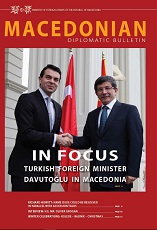
We kindly inform you that, as long as the subject affiliation of our 300.000+ articles is in progress, you might get unsufficient or no results on your third level or second level search. In this case, please broaden your search criteria.

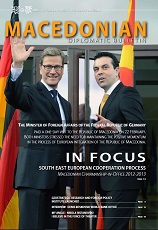
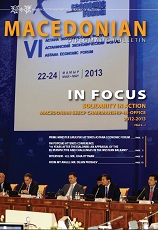
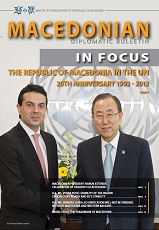
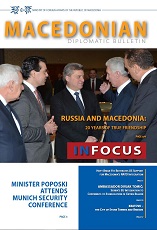
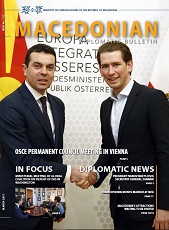
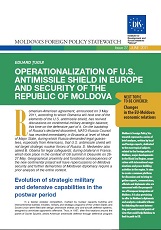
Romanian-American agreement, announced on 3 May 2011, according to which Romania will host one of the elements of the U.S. antimissile shield, has revived discussions on continental military-strategic balance, this time on the defensive part of it. On the backdrop of Russia’s declared discontent, NATO-Russia Council has reunited immediately in Brussels al level of Head of Major State, during which Russia demanded legal guaran¬tees, especially from Americans, that U.S. antimissile shield will not target strategic nuclear forces of Russia. D. Medvedev also asked B. Obama for legal safeguards; during bilateral in France, which took place in the context of G8 summit in Deauville on 26-27 May. Geographical proximity and functional consequences of the new continental project will have repercussions on Moldova security and further demarches of Moldovan diplomacy require a prior analysis of the entire context.
More...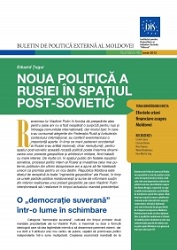
The return of Vladimir Putin as President elected for six years was not necessarily a surprise for the Russians and the international community, but the absolutely specific way in which elections took place in the Russian Federation and the international context turbulence gave this event a special importance. While major western partners of Russia were reserved if not even dissatisfied, for the post-Soviet area this political castling may mean that some geopolitical projects and military architecture will be more dynamic and was treated with great interest. Often, within the public space of the former Soviet republics, Russia’s internal political process and investing of the most powerful politician in the last twelve years came to be understood sometimes as a prerequisite for a new destiny. The Republic of Moldova is quite receptive to all “geopolitical engineering” of Russia, while some Moldovan political parties and information sources support from within the realization of a geopolitical project that Vladimir Putin intends to achieve during the current presidential term.
More...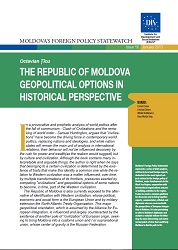
In a provocative and prophetic analysis of world politics after the fall of communism - Clash of Civilizations and the remaking of world order - Samuel Huntington, argues that "civilizations" have become the driving force in contemporary world politics, replacing nations and ideologies, and while nation states will remain the main unit of analysis in international relations, their behavior will not be influenced decisively by the rush for power and wealth(as the realism would suggest) but by culture and civilization. Although the book contains many interpretable and arguable things, the author is right when he says that belonging to a certain civilization is determined by the existence of traits that make this identity a common one while the relation to Western civilization was a matter influenced, over time, by multiple transformations of its frontiers, pressures exerted by competing "civilizations" and geopolitical options of some nations to become, in time, part of the Western civilization. The Republic of Moldova is also currently exposed to the alternative of identification with Western civilization, whose political, economic and social form is the European Union and by military extension the North Atlantic Treaty Organization. This major geopolitical orientation, which is assumed by the Alliance for European Integration, is influenced and largely counteracted by the existence of another pole of "civilization" of Eurasian origin, seeking to bring Moldova into a customs union and / or supranational union, whose center of gravity is the Russian Federation
More...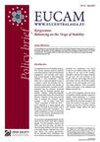
In 2002, Romano Prodi, then President of the European Commission, proudly announced a plan to create a unified border guard for the European Union. Police from various member states would serve together under the EU flag to protect their common external borders. The idea sought to promote a common European identity and to assuage continent-wide fears that the EU’s borders were hopelessly under siege. “We would like to reassure our citizens,” Prodi declared, “that we will protect our borders against terrorism, organised crime and uncontrolled immigration.” While a common EU border guard has yet to see the light of day, a common EU export strategy has emerged in border management assistance. Such assistance aims to help recipient states strike a healthy balance between open and secure borders. This is not entirely altruistic.
More...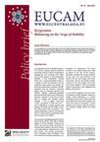
The European Union’s Strategy for a New Partnership with Central Asia is approaching its fourth year of implementation. In that time the EU has placed its relationship with Central Asia on a more structured footing through the establishment of several formal initiatives designed to support seven engagement priorities in the region. The EU Development Cooperation Instrument (DCI) has allocated €321 million to support the Strategy between 2011 and 2013. Direct contacts between European officials and political leaders from the region, conducted in both Europe and Central Asia, are at unprecedented levels. Although progress has been made in building dialogue and in furthering engagement in certain defined areas, the limitations of the strategy are increasingly obvious.
More...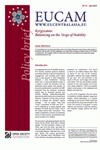
EU policy on Central Asia is unclear about the relationship between Afghanistan and Central Asia. The June 2010 Joint EU Council and Commission Implementation Report of the EU Strategy for Central Asia argues that cooperation in the area of security is of growing importance in EU-Central Asia relations, especially in light of developments in Afghanistan over the past few years. Even if security is among the Strategy’s seven key areas of engagement, the arguments put forward are vague: the Implementation Report states that “Afghanistan is a security issue of particular common concern and there is scope for more focused dialogue and cooperation between Central Asian countries and the EU”; and “there is a need to integrate the growing link between Central Asia and the wider region into EUCentral Asian cooperation.” The Central Asia-Afghanistan relationship is therefore evoked only to recall that the states of Central Asia are directly threatened by the insecurity emanating from Afghanistan.
More...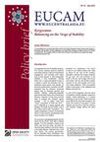
Relations between Central Asia and the post-Soviet countries of Eastern Europe have largely been developed in the shadow of Russia. Belarus, Moldova and Ukraine have established ties through integration projects in the post-Soviet space that are led by Russia, such as the Commonwealth of Independent States (CIS) and other initiatives. But against this, bilateral and multilateral relations between CIS countries have often been aimed at counterbalancing Russia’s dominance. GUUAM, for example, was an alliance between Georgia, Ukraine, Uzbekistan, Azerbaijan and Moldova formed in 1999; after the departure of Uzbekistan in 2005, it became known as GUAM. The organisation was conceived as an alternative cooperation project, and Moscow perceived it to be anti-Russian.
More...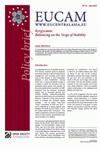
Mongolia is beginning to attract more interest from European organisations and institutions. A Partnership and Cooperation Agreement (PCA) between Mongolia and the European Union is expected to be concluded soon, and in March 2012, NATO agreed an Individual Partnership and Cooperation Program (IPCP) with Mongolia. In October 2011, the German Chancellor Angela Merkel took time out from dealing with the financial crisis to visit the country, and the OSCE Secretary General visited in June 2012 to discuss Mongolia’s request to become a fully participating member of the organisation.
More...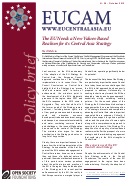
Last summer, on the fifth anniversary of the adoption of the EU Strategy for Central Asia, the European Council approved continuation of the Strategy’s implementation in its current form. The Council Conclusions on Central Asia highlight that the Strategy has ‘proven itself and remains valid’. In terms of achievements, the ministers point to the development of the EU’s diplomatic presence in the region since 2007 and the EU’s response to the 2010 crisis in Kyrgyzstan. They note that while all of the former goals of the Strategy remain pertinent – including human rights, rule of law, good governance and democracy, youth and education, economic development, trade and investment, energy and transport, environmental sustainability and water, combating common threats and challenges – the issue of Afghanistan has moved to the centre of the Strategy. The ministers also argue for clearer prioritisation in the Strategy and set out a long list of key priorities.
More...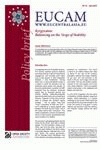
Most former Soviet republics began to consider police reform in the 2000s, over a decade after the Soviet Union’s collapse. By then, the police in the successor states had become one of the most corrupt government agencies, with reputations for serving the needs of political elites and criminal leaders rather than the public. Kyrgyzstan and Tajikistan were the first Central Asian countries to attempt to reform their police. Leaders from both governments invited the Organisation for Security and Cooperation in Europe (OSCE), the United States and the European Union to assist them in their efforts. In both countries, the reform process has been slow and has consistently failed to meet the expectations of donor organisations and of members of civil society. Meanwhile, law enforcement agencies have become even more corrupt and aggressive toward the population.
More...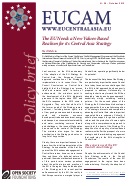
The European Union’s (EU) Strategy for Central Asia is being reviewed for the fourth time. Over the last eight years, the EU has been successful in creating several institutionalised mechanisms for working and bolstering relations with Central Asian governments, including an increased presence on the ground. But the overall picture of the EU’s engagement in Central Asia is one of limited to no impact. The region has become more unstable; democracy is seen by the regimes as a threat to their survival; and human rights have been backsliding. Whereas some global and regional actors have laid out a broader policy vision for Central Asia – ‘New Silk Road’ by the United States (US), ‘Silk Road Economic Belt’ by China – the EU devised a detailed written strategy in 2007 outlining seven priorities ranging from democracy promotion to education and from security to energy and trade interests.
More...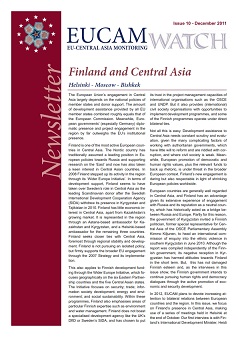
The European Union’s engagement in Central Asia largely depends on the national policies of member states and donor support. The amount of development assistance provided by all EU member states combined roughly equals that of the European Commission. Meanwhile, European governments’ (especially Germany) diplomatic presence and project engagement in the region by far outweighs the EU’s institutional presence. Finland is one of the most active European countries in Central Asia. The Nordic country has traditionally assumed a leading position in European policies towards Russia and supporting research on the ‘East’ and now has also taken a keen interest in Central Asian countries. In 2008 Finland stepped up its activity in the region through its ‘Wider Europe Initiative’. In terms of development support, Finland seems to have taken over Sweden’s role in Central Asia as the leading Scandinavian donor after the Swedish International Development Cooperation Agency (SIDA) withdrew its presence in Kyrgyzstan and Tajikistan in 2010.
More...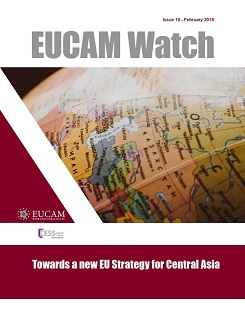
Ten years after the inception of the European Union’s (EU) Strategy for Central Asia, in June 2017 the European Council initiated a process to develop a new strategy by 2019. The ‘reviewed and renewed’ strategy will take into account geopolitical developments, Central Asian preferences as well as the EU’s 2016 Global Strategy. This process offers an opportunity for all stakeholders – Central Asian governments, EU member states, human rights defenders and the research community, among others – to play a role in re-shaping the EU’s policy towards the region. After a decade of relationship-building and cooperation, it is time to evaluate what worked and what did not, and gather and apply lessons learnt to improve the new strategy amidst a drastically different internat ional environment.
More...
The verdict of the War Crimes Chamber of the Belgrade District Court against Scorpios accused of killing six Bosniak civilians in Trnovo, BiH, in July 1995, issued on April 10, 2007, is not based on law and facts established during the evidentiary proceedings. It seems that the court was guided by political and not legal reasons, in order to adjust to the attitudes of the Serbian authorities regarding the responsibility for the Srebrenica genocide in the context of the International Court of Justice ruling and show understanding for the patriotic orientations of some Scorpios.
More...